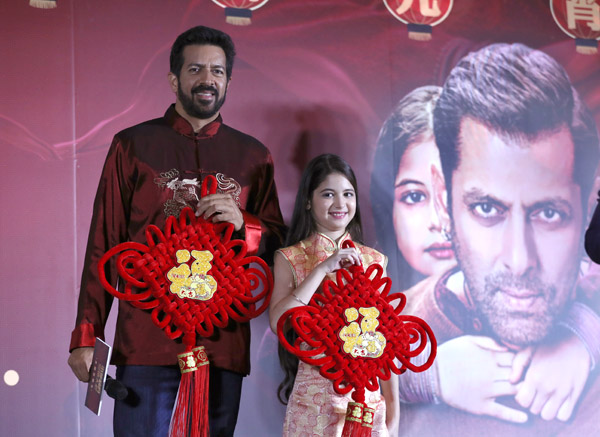 |
|
Director Kabir Khan (left) and Harshaali Malhotra hold Chinese knots at a promotional event in Beijing. [PHOTO BY ZOU HONG/CHINA DAILY] |
Kabir Khan says he agreed immediately to do the film when he was approached by the writer.
"I felt it was a very sweet story, which spoke about very large issues in a very effective manner," he says.
Both Kabir Khan and Salman Khan believe that India is about religious coexistence.
And Kabir Khan says: "That's why it was important to make a movie like this, which basically talks about the fact that sometimes you get stereotypes about other people but ultimately all human beings are the same.
"They have the same emotions and same reactions to situations."
Kabir Khan says if he is given another story with a similar message, he would like to make it into a film.
"Every film, at the end of the day, does reflect the ideology and thinking of the filmmaker," he says.
The 6-year-old girl Shahida causes the audiences to both laugh and cry.
The role is played by Harshaali Malhotra, whom Kabir Khan chose from 2,000 girls who auditioned for the part.
"We brought eight to 10 girls to a workshop to Bombay for about one month and then we selected her," says Kabir Khan.
"She is very shy but talkative once she is comfortable."
Bajrangi Bhaijaan is the first Kabir Khan movie to be shown in China, and he is glad that Indian cinema is well accepted by Chinese audiences.
He thinks it is natural because India and China are old Eastern cultures, and both react to emotional stories in a similar fashion.
"Actually, it's logical that India and China enjoy each other's films much more than Hollywood," says Kabir Khan.
"I hope we can get more Chinese films into India because I think there's a lot we can share."
Kabir Khan first visited China in the 1990s to shoot a documentary for the Discovery channel called Beyond the Himalayas.
He is now planning to work with Chinese actors or collaborate on a film with a Chinese film company.